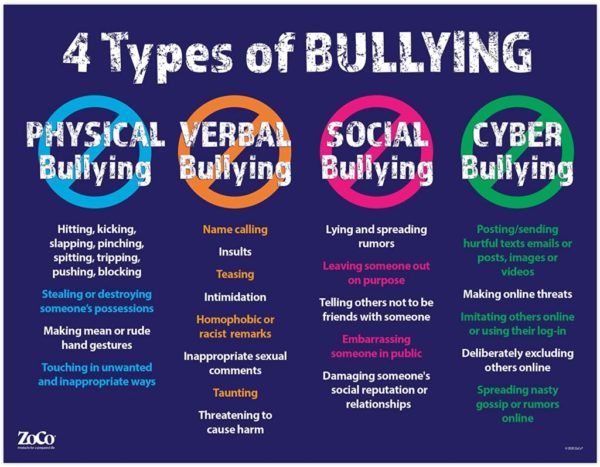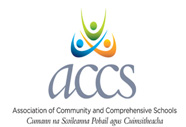Counter-Bullying
 What is Bullying?
What is Bullying?
Bullying is unwanted negative behaviour, verbal, psychological or physical conducted, by an individual or group against another person (or persons) and which is repeated over time’. It is a very wide term, with lots of possible meanings and examples:
 The following types of bullying behaviour are included in the definition of bullying:
The following types of bullying behaviour are included in the definition of bullying:
• deliberate exclusion, malicious gossip and other forms of relational bullying;
• cyber-bullying;
• Identity-based bullying such as gender including transgender, civil status, family status, sexual orientation, religion, age, disability, colour, race and membership of any ethnic minority;
• Bullying of those with disabilities or special educational needs.
 The Effects of Bullying
The Effects of Bullying
The effects of bullying can be devastating and stay with a person for a long time and so it is everyone’s responsibility to be aware of their own actions, to watch out for others and protect themselves.
Effects of bullying on the victims
The effects of bullying on the victims are manifested in a number of ways. Bullied students:
- Complain of a variety of health symptoms like headaches or stomach aches either before and/or after school
- Fake illnesses
- Become fearful, sad, or moody
- Have little or no appetite or are binge eating
- Become anxious
- Become depressed
- Do poorly in school or lose interest in school
- Are unable to sleep or complain of bad dreams
- Have unexplained cuts, bruises, or scratches
- Don’t want to use the phone or the internet
- Come home with missing or damaged belongings
- Effects of bullying on the victims in later life
The effects of bullying and cyberbullying can continue well into adulthood. It can have long-lasting effects on mental health and social life for the victim. The victim may have trouble with grades and overall academic performance in college. There can be persistent anger and a feeling of wanting retaliation. There can be a higher risk of substance abuse, and poor employment performance. There is also the possibility of increased mental health problems like anxiety, panic disorders, depression, and suicidal ideation.
Effects of behaviours on the bullies
One might not think that the bullies themselves have any short or long term effects from their behaviour. However, nothing is further from the truth. As a student, once the bullying behaviour is identified and confronted, the bully can themselves experience anxiety and psychological distress. They may begin to abuse alcohol, tobacco, marijuana, or engage in early sexual behaviour. The bully may have run-ins with the law from vandalism, fighting, shoplifting, and traffic violations. They may be more prone to carry weapons and engage in more anti-social behaviours. According to some studies, bullying can even lead to criminal behaviour later in life.
The effects of bullying on the bystanders
While there are effects of bullying on both the bullied and the bully, there are also effects on bystanders. According to Cameron Paediatric Counselling, these students can suffer from fear and anxiety about becoming the next victim, depression because they’re unable to handle the emotions from what they are seeing, uncertainty because they know bullying is wrong, guilt from not intervening, and insecurity because they’ll feel helpless if the bullying happens again.

The Causes of Bullying
There can be lots of reasons that students may engage in bullying.
https://www.verywellfamily.com/reasons-why-teens-bully-others-460532
JTBCS always aims to take a holistic and mindful view of the student and the events in question, mediated through the lens of restorative practice. A Restorative Practice Team was formed in September 2020 and all staff are receiving ongoing training, including members of the Senior Management Team, including Assistant Principals.
If a bullying incident occurs, students who engaged in such harmful behaviour are given the opportunity to learn from the experience. If a student repeats such behaviour, an Appendix 1: Template for Recording Bullying Behaviour will be completed by the Year Head in conjunction with the student. A programme of support for everyone involved in bullying behaviour is also part of the school’s intervention programme. Support is also available for students involved in bullying behaviour, through the Cabhair team to help them learn other ways of meeting their needs without violating the rights of others. Students who observe incidents of bullying are encouraged to discuss them with teachers.
Cyberbullying
Isolated or once-off incidents of intentional negative behaviour, including a once-off offensive or hurtful message through phone calls, text messages, emails, instant messaging (IMs), and direct messaging (DMSs), using text, picture or video on any social media platform e.g. Instagram, Facebook, Tiktok, Snapchat, whatsApp, Twitter etc., are dealt with, as appropriate, in accordance with the school’s Code of Behaviour. Please use the following link to view types of cyberbullying https://tacklebullying.ie/cyberbullying/what-is-cyberbullying/
In the context of our school policy, placing a once-off offensive or hurtful public message, image or statement on a social network site or other public forum where that message, image or statement can be viewed and/or repeated by other people will be regarded as bullying behaviour. There is a legal obligation on the part of the school to report any incidents or suspicion of sexting immediately to the Gardaí
Please see our Technology Enhanced Learning Policy and our Digital Wellbeing page for more details https://johnthebaptistcs.ie/digital-wellbeing/
What to do in the face of bullying?
Communication is key to stopping bullying. As a student and as a parent, reaching out to the school, such as the designated person the Year Head is vital. Report it to stop it. We understand this can be a very difficult thing to do but at John the Baptist C.S. we know that to ask for help is a a true sign of strength.
 Our Counter Bullying Policy
Our Counter Bullying Policy
More information about how the school looks at bullying is available through our Counter Bullying Policy:
 Loading...
Loading...
Other policies that are helpful to guide you through this area are our Code of Behaviour and the Technology Enhanced Learning Policy.
Some Resources for Parents/Guardians
Bullying can be very difficult for all involved. Support and guidance from home can help students navigate this difficult time, no matter their role in the experience.
Tackle Bulying.ie is an excellent site with a huge array of information and details to help deal with bullying:

Cyberbullying
https://www.ispcc.ie/signs-your-child-might-be-bullying-someone-online/
https://www.ispcc.ie/young-people-and-sexting/


 What is Bullying?
What is Bullying? The Effects of Bullying
The Effects of Bullying


 Our Counter Bullying Policy
Our Counter Bullying Policy